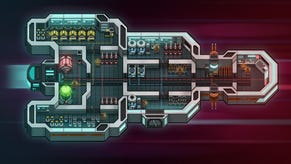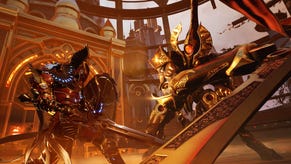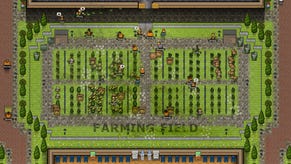Introversion Unveil Prison Architect's Alpha Launch
The Greenback Mile
Prison Architect is coming along nicely, as I've reported previously. Now though, the Introversions - Chris Delay and Mark Morris - want players to help push the design process along, as well as some pre-order money to keep themselves in bread and water. With that in mind, there's now a tiered pre-order option open, and you can get involved for a price. We talked to them about that at length, and you can read the interview - and watch the videos - below.
RPS: Whatcha doin' Introversion?
Delay: We're launching the alpha! We're including most of the stuff that we've got finished, which is everything that we're happy to show that we've made so far. There are a few features that are so game-breakingly broken that we don't dare include them in this alpha release, but other than those we're putting in the lot. It's quite similar to the build that you played which had the Death Row story level and the open sandbox, where you could just build whatever prison you liked... until it descended into open riots.
RPS: Is a stable prison build possible?
Delay: You mean “is it possible to build a prison that will last indefinitely?”
RPS: Yes.
Delay: Well it is possible, but I am working relatively hard to rule that out! Not really. But I think it will depend on the options you choose to start your prison. Right now there aren't that many options for the sandbox starting conditions, you can only really pick the size of it, but I like the idea of expanding the concept of fun within the idea of building a prison. I've always liked the way Dwarf Fortress does things – there's a fatalism about it: you know that your fortress will always be destroyed eventually, and the reason is that every year you'll be attacked by a bigger and nastier horde of enemies. The equivalent analogy in Prison Architect is that you have a finite amount of space, which is set at the start, but you continue to receive prisoners. That resulting compression of space over time becomes the limiting factor, and will eventually result in devastation. But again, this an alpha, so it's going to be interesting to see what people think about these ideas. We want to get people's opinions. If they're things that people want to do next, then they'll start shooting up to the top of the list.
RPS: This is going to be the kind of alpha where progress is defined by the feedback loop between grumbling players and desperately coding developers?
Delay: You describe it in such enticing terms! I think we're definitely hoping for that. We've been developing Prison Architect for two years now, and I think when you've been developing for that length of time you can become myopic and get focused on lots of minor details. We're really hoping with this alpha to open it up a lot more. We have a list of things that we want to put into the game, but we want feedback from players now. Mentioning Dwarf Fortress again, I love that he has this huge list of things he wants to support, and we do too. Now, though, we want to see what things on that list players are interested in. It's an open list.
RPS: How has the response been when you showed the game at events like Rezzed?
Delay: Anecdotally we've seen a lot of people interested. At Rezzed we had four computers showing the game the whole time, and they were never actually free. They were busy the whole time.
RPS: That was the second most popular game on the attendee's survey for Rezzed.
Delay: That's one of those facts that's simultaneously both really great and really annoying.
RPS: Yes, it is. But given the breadth of games that were there – Borderlands 2, Day Z – it seems to me that to come second really says something. Although perhaps it says something about the mind of the kind of people who like to fill in surveys.
Delay: Yes, you will get a curious sub-group with that survey, won't you? All the people that came to the Rezzed, and then that particular type that filled in the form... But yeah, we got good response. We had to boot people off at Rezzed, with folks sat playing for hours. It hasn't always been like that for Introversion games.
RPS: Yes, you're going into a more Bullfrogian open-ended management with this, where the previous games were more tightly “gamey”. Is that a maturation of your interests?
Delay: Possibly. Bullfrog is my favourite game developer of all time. I've loved all the management games, each one for different reasons. More recently I've got into Dwarf Fortress and games like that, which in my mind are offshots of previous eras of management games. They're niche variants where everything is so detailed. And so, as ever, we've ended up making a game that I really want to play.

RPS: Do you think certain people will be put off by the prison theme?
Delay: Possibly, yeah. I think it depends on the handling. We've been developing for a couple of years, largely in isolation, we're probably not aware of how people are going to respond. Going on the reactions at Rezzed, well, we did see it evoke an emotional response in players.
RPS: I think the thing that struck me in the couple of times I've played it is the dissonance between it being quite cartoony in presentation, and being brutally dark, thematically. You feel uneasy after a while. Grimness in icon-based presentation, it's extraordinary. Someone said to me that it was disappointing to see you guys going down a “standard art route”, rather than something glowy and neon, but I think this is actually an even more interesting mixture of classic management presentation and human horror.
Delay: That is intentional. There are two sides to Prison Architect: a series of campaign levels, which are story and objective-driven, and an open-ended sandbox. In the first design of the game it was just the sandbox, but very quickly we realised that very few people know how to build a prison, and very few people know why they would want to buy a prison. So we started out with tutorial levels, and this has evolved. We realised we were dealing with a political topic – you can't remain abstract when it is a game about prisons. We had to have a story involving characters which was told in a relatively mature way. That was the birth of this mixing of cute abstract sprites and the more realistic weighty story. I've been attracted to dark themes – perhaps most obviously in Defcon, which is a genocide-level strategy - but we'd kept that fairly abstract. It didn't need to be humanised. But this game did. Not all the story levels will all have the same level of darkness as that death row level.
RPS: Well even in the sandbox you are seeing the tiny iconic inmates being beaten to death in the showers...
Delay: Yes, and that is interesting because there you are seeing what in any other game would be a full on battle. It's an odd one for a strategy game, because the enemy is always within your own walls, and you're not ever allowed to engage them directly. Normally, in Dungeon Keeper for example, you build up and army and fight the enemy. Here, though, there is no definite enemy, no final battle.

RPS: The AI behaviour, all the little guards and prisoners, that seems to have had a lot of work put into it. I played out one situation – a fight on some showers - several times, and each time it played out differently. Is that intentional?
Delay: I know specifically what you are talking about, and that's actually quite a serious bug. That's the fight in the showers at the bottom left of the map? The thing is that we've spent a lot of time trying to figure out causality, and make it so that prisoners need a reason to fight each other. I think in that build that area had the odds of a fight tuned up really high, for video capture purposes, and that's why you experienced a strange randomness.
RPS: Hmm, but even the fight itself played out quite differently each time.
Delay: Yes, there are a lot of factors kicking off when there's a fight. And one of the key aspects of Prison Architect is that you don't have direct control over the guards of the inmates. You don't leave your guard there and that's it. It's all indirect. Your guards simply do their best to deal with the situation they face. That's one of the areas that we want to point out, for the sake of the alpha, aren't finished yet. We have some designs for how guards deal with fights, but few real game mechanics yet. We haven't figured out how to do it in a good way. I've always wanted the game to occur at a higher levels, where you set policies, equip guards, set rules of engagement, but once fights break out, you just have to see what the aftermath is. You get to see the results of your decisions. During the alpha we'll be tackling that.
RPS: Why is indirect control interesting?
Delay: I think it's because I want to be able to create a prison which is completely self-managing – players arrive, go through the regime, leave again, and the whole operation of the prison is simulated and automated. And you can never get there, it's never really achievable. The issue with the indirect control over your teams, is one of fitting with the game. You never even directly build anything: you simply request that the workmen go and do it. I like that element of not being able to directly control, and partly that's a visual thing: a satisfaction of watching a large group of entities carrying out your commands. The clean up operation after the fights for example, is fascinating to watch. This all happens in response to the policies you've set. This mass movement of people and debris happens and it's a fascinating experience watching that play out in your world. I still love the Starcraft mode of micromanagement, but this isn't that game. In Darwinia you created officers and gave them instructions. It's a common theme that I've always liked.
RPS: So what's the plan for this alpha release then?
Morris: The basic tier is $30. You get access to the alpha immediately, and you'll get the full game and Steam keys and all the rest of it when that's finally done. We've created a series of higher tiers. The more you're willing to pay, the more you can get involved in the alpha. You can get your name in the game and write the prisoner biography, that goes all the way up to our $1000 tier where you can design a unique warden who has an individual power like the world leaders in Civ do. We want to offer genuinely valuable opportunities to get involved and immortalise yourself in the design process, while tapping into the enormous vein of generosity that exists in the gaming community. I don't think anyone has taken quite this approach before, so we have how this will work. It'll be really fascinating for us to see how interesting it is, whether we've got the pricing right, and so on. We've never done anything like this before!
RPS: Thanks for your time.
The Introversion alpha bundle is available now.










